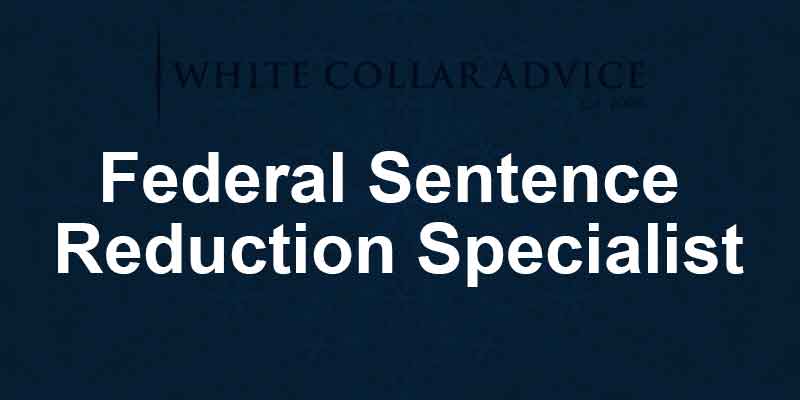Alan, a veteran and white collar defendant, called to tell me he thought I was a highly qualified, “Federal Sentence Reduction Specialist.” When I heard that term, I told him I loved it! In my career, I have been a called a number of things (I will only list the positive one here), including, “Federal Prison Consultant,” White Collar Expert”, and now, “Federal Sentence Reduction Specialist.”
When Alan told me his name, I recognized it. I knew that a few weeks ago Alan had opted in to get a free copy of my book. He told me that was under criminal investigation for wire fraud, mail fraud and bank fraud. I learned that he had been a banker since retiring from the military in 2001.

Federal Sentence Reduction Specialist
“I read your book and so did my wife,” he said. “We both thank you for writing it and for helping us better understand what life is like in federal prison. We would also like to thank you for being so vulnerable and honest. It really helped us understand where we are in this process and where we need to be. As of now, we are not quite there, but we want to be,” you could feel his humility.
Lessons From Prison is more than 50,000 words. I have been advised to give away something that is not so long. The prevailing idea is that people who come across my work might feel overwhelmed with so much information. Instead, I have been told, I should give away a simple 10-15 page report, then hound the reader to death through marketing emails. That might work for some marketers, but that is not my style.
I wrote a book that I needed when I was fired from UBS for facilitating a fraud. I needed to know how good people who make bad decisions can better work with their white collar defense lawyer, manage their reputation, career, and work towards receiving the most favorable outcome at sentencing. I could not do that in 10-15 pages.
“I have to ask where did you come up with that term, Federal Sentence Reduction Specialist?” I was curious.
“My wife’s lawyer referred us to a prison consultant. When we called him he told us he was a federal sentence reduction specialist. After speaking to him, we did more due diligence. He was okay. He told us he would be available to answer questions we had about prison, but really nothing more. I have no idea what I should even ask. Then we did some more research and found you. We read at least 25 of your blogs, read your book, watched your videos and decided you were a better fit.”
“Is there something I said that really resonated with you?”
“Yes, two statements come to mind,” Alan said.
“Which statements?” I asked.
“You said defendants should not be worried about life in prison, but rather what the rest of their life would look like because they went to federal prison. And you said defendants must ensure the government does not get one day longer than the federal prison sentence they hand out,” he nearly repeated them to be verbatim.
“Are these two concerns keeping you up at night?” I know I should have been focused on them when I was in his spot. Instead I was lying to my lawyer, gorging myself on Tito’s Tacos, and lying my way through interviews with the FBI.

Tito’s Tacos
“Yes. I was in the military for a number of years. I lived on a ship, in small quarters. I can handle federal prison. I have much to learn. I plan to learn. I want to succeed there. But I know those “doors will someday open” as you like to say. I am so scared for my family and I am wrought with fear over how I will rebuild as a result of this ordeal. I have started a small business and want to keep it going while I’m away.”
He continued, “As a veteran, I am taught not to give up and to think of others. Until I read your book, I was totally failing. I might not yet be in prison, but I am already there. I am too tired to exercise, I have not touched my beautiful wife in months and my kids look at me differently. I no longer feel like their hero, the awesome military dad! I threw our life away. Whatever sentence I get should include this time I am serving now. I need to learn to take responsibility for my actions and not be a constant rain cloud over my family.”
“I admire your honesty. Rather than run from the reality, you embrace it. You have already recognized that this process is harder on your family. I can tell you want a better way, rather than just talking about a better way. Oliver Wendell Holmes said, “The great thing in this world is not so much where we are but in what direction we are moving.” Confinement will be but a blip in your life. The beautiful thing is you can pursue greatness and restore your pride wherever you are. Yes, you made some bad decisions. We are humans, fallible. But the decisions you made that led you here do not have to define your future–nothing matters as much as what lies ahead in your future. With the right approach your future can be better than you could possibly imagine,” I told him.
This veteran who called me is wounded, but not broken. The more I spoke to him the more I realized he is someone who has lived his whole life with a vision. He is just sidetracked for the moment. Part of my job is to get him back on track.
Like all of us, Alan has huge dreams, but wonders if they are too elusive given his current obstacles, problems and circumstances. I was quick to remind him that history is full of convicted felons who have thrived through some miserable circumstances.
What those successful convicted felons did exceptionally well was define what they were after. I frequently hear, “But, Justin my skillset is not as advanced as those people,” or “they were younger, had more resources” and so on. I am not a buyer.
Those who have thrived weren’t geniuses (I most certainly am not). Many never went to college or had resources. It would be easier I suppose with resources and a top education; but it is not a requirement. Those prisoners simply identified what they were after and they followed their code of values/principles to get there.
Our on call Alan referenced Viktor Frankl, who I wrote about in Lessons From Prison. He found Frankl’s story inspiring and he told me had just finished, Man’s Search For Meaning.
I recited a quote from Frankl I memorized in federal prison: “Everyone has his own specific vocation or mission in life. Everyone must carry out a concrete assignment that demands fulfillment. Therein he cannot be replaced, nor can his life be repeated. Thus everyone’s task is as unique as his specific opportunity to implement it,” Frankl said.
Frankl wrote about having a mission and purpose in life. That mission should not be derailed because of a looming prison term. If Frankl’s mission was not derailed while watching his family get summarily executed in the concentration camps, what excuse do you have?
Of course, there are specific “prison consulting” things Alan and I must address. We will write his personal narrative for his pre sentence interview, ensure he fully understands the nuanced Residential Drug Abuse Program, and more. I will also offer some suggestions that will get his lawyer to respond to one of the last 25 emails he has sent him. We are creating a sentencing video that will highlight his charitable work and express why he is truly a distinguished veteran. There is no doubt these activities will help mitigate his federal prison sentence.

Viktor Frankl
Beyond my “prison advice”, however, we will tackle bigger issues, like concentrating on the small business he is growing from home. That business must sustain his family while he is away. We will focus on making measurable, meaningful progress. It will include learning to let go of the past. He will own his story and share it in public speaking forums I will line up for him. Those events will help him grow his network and demonstrate that he will not be defined by his past.
Alan talked about the consequences of his actions and feeling like a failure. It is true there are lifelong consequences of a white collar crime. That does not mean, however, that the stigma of feeling like a failure must persist. Alan must create a new record that others (including the probation officer, prosecutor and judge) can judge him by. But he has to get started.
For privacy reasons I will not get into the business that Alan has started. I will, however, state that this business is the focal point of our “non federal prison planning”, which is vast. He really had no idea where to start and realized that even if we successfully reduce the length of his prison term, he will still have obligations that cannot be ignored.
Running a business in prison, I told Alan, will require that I teach him how to manage his time, emotions, goals, and his tendencies. He also needs to relearn how to lead and to set the tone, something he is struggling with. He also must learn to delegate, and understand that teamwork is at the heart of any achievement. Evan Wyatt Earp had Doc Holliday looking out for him!
QUESTIONS ABOUT HOW TO GROW A BUSINESS FROM PRISON? SCHEDULE A CALL HERE…
Delegating and training others would be hard, Alan said. He told me no one knows the business as well as him, and that trusting others while he was in prison would not be easy.

Robert Goizueta
“Do you know who Robert Goizueta is?”
“Yes. Former CEO of Coca Cola. Why,” Alan asked me.
“Coca Cola was the first stock I ever owned. It is the first stock I bought for my daughter. I have always had an obsession with Coca Cola (ticker symbol: KO). I have read many books on Coca Cola, including its former CEO Goizueta, who grew Coke from a $5 billion company to $150 billion. Sufficed to say he was a pretty good leader.
Through my readings, however, I learned that Goizueta did something more valuable than creating shareholder wealth. He was a master forward thinker. He pursued his goal to make Coca Cola the best it could be until his death in 1997.
When some CEOs pass away the stock tanks and trust erodes. Not with Coca Cola. Like you will learn to do when you go to prison, Goizueta left a legacy and contingency plans in place. Long before he developed cancer he had a succession plan in place. He had trust in his team and knew that he had an obligation to Coca Cola shareholders to ensure there was no slowdown if he retired or died.
He worked each day to make the company strong. He trained and delegated beautifully. He knew he would not be around forever, just like you will not be free forever: you have a prison term coming.
We do not have to run a $150 billion company to learn from Goizueta. As he did, we will groom leaders in your organization, tap their potential and make sure things are running smoothly each day you serve in prison. I will mentor you and you and I will mentor your team. You will feel more at peace because you will have a created a culture of trust. Your prison adjustment will facilitate the growing of this business. Indeed, you will grow this business from the inside, I assure you!”
I was so immersed in my call with Alan that we were on the phone for two hours before we agreed to formally work with each other. I was too focused on listening and offering helpful advice.
I feel so privileged to help this wonderful veteran and his family. I take the responsibility seriously. I know the challenges that await him. I know the challenges that come to those who do not prepare properly. Beyond being his “federal sentence reduction specialist” (a term might not use again), I will proudly take the lead on helping him better manage his family and business before, during and after federal prison.
Best,
Justin Paperny
818-424-2220
P.S. Schedule a call here to learn how to manage or grow your business from federal prison.
CNN Exclusive: Justin Paperny Analyzes Sam Bankman-Fried’s 25-Year Sentence
https://youtu.be/KgP_9aRrEZs I was saddened to hear Sam Bankman-Fried say his useful life is over. Many individuals facing prison share that sentiment, and I certainly did during my own experience. Navigating through such challenging times requires learning from those...
Breaking Down Sam Bankman-Fried’s Upcoming Sentencing
https://youtube.com/live/WC59hWkUUE8 Join me in this live session as I cover the upcoming sentencing hearing of Sam Bankman-Fried, scheduled for tomorrow before Judge Kaplan. As many of you are aware, the government is pushing for a hefty term of up to 50 years in...
Get Out Of Federal Prison Early!
If you are going to federal prison, we know you want out as quickly as possible. But how? https://youtube.com/live/2jTG3MexFog It starts with understanding stakeholders, including case managers. Case managers are key figures within this system, maintaining lists...
What’s Next for Peter Navarro at Miami Federal Prison Camp?
Following a CNN interview about Peter Navarro, I got many nasty Instagram messages and a phone call from someone claiming to be close to his family. Essentially, he called to reprimand me or give me the "411," as he said. To be clear, I don't think Peter Navarro...
White Collar Advice: Your Guide Through the Sentencing Journey
Hi Alec Burlakoff here, with White Collar Advice. I am writing to share insights on the sentencing journey. This morning, I had a talk with someone who felt like he was navigating through a storm without a compass when it came to sentencing and mitigation. It struck...
The Most DANGEROUS Thing In A Federal Prison Camp
https://youtube.com/shorts/KlWP-3VOVvo Federal Prison Camp My first day in federal prison included the basics: ProcessingObserving the layout of the campEating in the chow hallStanding for count You know the basics! Yet, it was during a seemingly mundane walk around...


How do we get a sentence reduction for my daughter Michelle Whitman was charged for resume paper to write checks no way